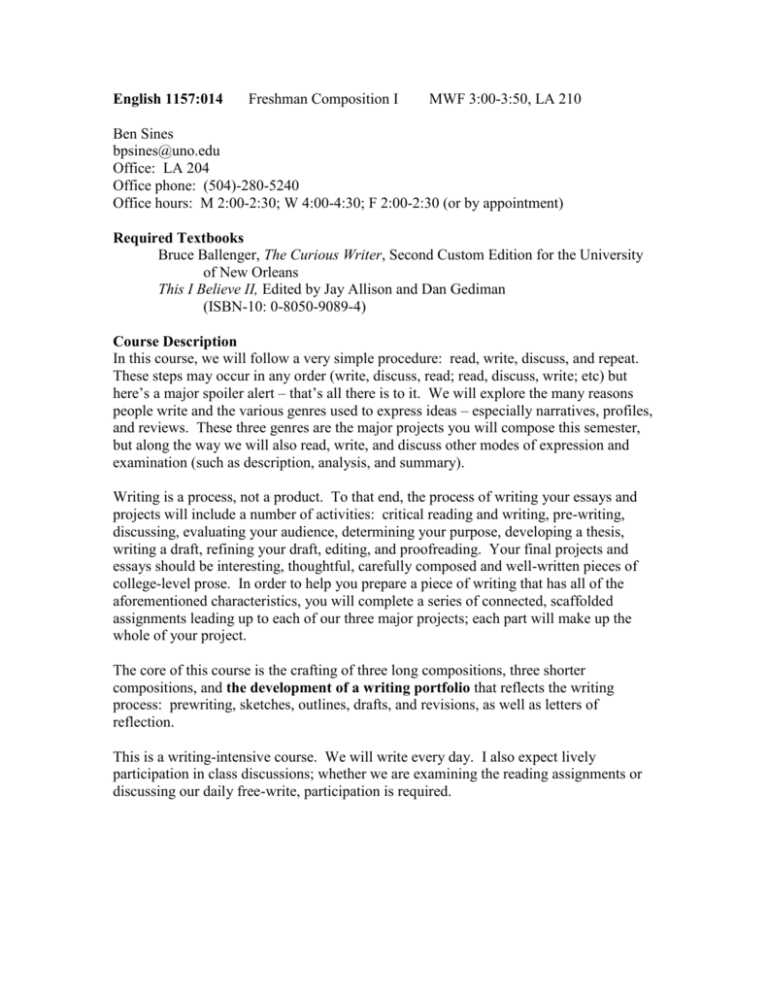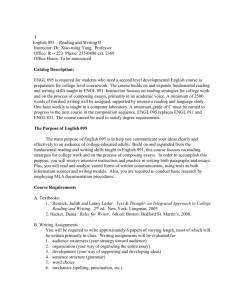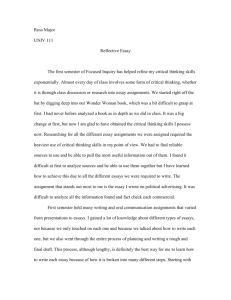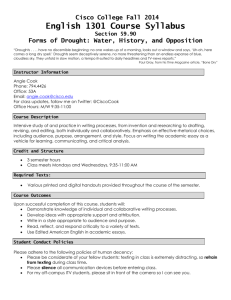Fall 2014 Syllabus
advertisement

English 1157:014 Freshman Composition I MWF 3:00-3:50, LA 210 Ben Sines bpsines@uno.edu Office: LA 204 Office phone: (504)-280-5240 Office hours: M 2:00-2:30; W 4:00-4:30; F 2:00-2:30 (or by appointment) Required Textbooks Bruce Ballenger, The Curious Writer, Second Custom Edition for the University of New Orleans This I Believe II, Edited by Jay Allison and Dan Gediman (ISBN-10: 0-8050-9089-4) Course Description In this course, we will follow a very simple procedure: read, write, discuss, and repeat. These steps may occur in any order (write, discuss, read; read, discuss, write; etc) but here’s a major spoiler alert – that’s all there is to it. We will explore the many reasons people write and the various genres used to express ideas – especially narratives, profiles, and reviews. These three genres are the major projects you will compose this semester, but along the way we will also read, write, and discuss other modes of expression and examination (such as description, analysis, and summary). Writing is a process, not a product. To that end, the process of writing your essays and projects will include a number of activities: critical reading and writing, pre-writing, discussing, evaluating your audience, determining your purpose, developing a thesis, writing a draft, refining your draft, editing, and proofreading. Your final projects and essays should be interesting, thoughtful, carefully composed and well-written pieces of college-level prose. In order to help you prepare a piece of writing that has all of the aforementioned characteristics, you will complete a series of connected, scaffolded assignments leading up to each of our three major projects; each part will make up the whole of your project. The core of this course is the crafting of three long compositions, three shorter compositions, and the development of a writing portfolio that reflects the writing process: prewriting, sketches, outlines, drafts, and revisions, as well as letters of reflection. This is a writing-intensive course. We will write every day. I also expect lively participation in class discussions; whether we are examining the reading assignments or discussing our daily free-write, participation is required. ENGL 1157:014 – Sines 2 Course Writing The work in this class will be comprised of three projects, each culminating in a Long Composition (LC). In preparation for each LC, you will compose a Short Composition (SC) which will help you understand the genre in which you’ll be writing. These major assignments will be supported with a number of activities, called Process Work (PW) which you will complete both in class and as homework (PW includes fast writing, brainstorming, group work, journals, sketches, drafts, peer review, workshops, research, and more). At the end of each project, you will turn in a project packet in a manila folder that includes the final draft of your LC, your previously graded SC, all your PW, and letter of reflection in which you discuss your writing experience and address what revisions you would or would not make if you had more time. At the very end of the course, you will compose a final letter of reflection in which you look back at your experience over the course. This reflection will serve as an introduction to your portfolio. Assignments and Grading Projects are graded on a 100 point scale: A=90-100, B=80-89, and so on. This should go without saying, but you must submit all the assignments required for this course in order to earn a final course grade higher than F. Work that receives an “A” is outstanding relative to the level necessary to meet course requirements Work that receives a “B” is significantly above the level necessary to meet course requirements Work that receives a “C” meets the course requirements in every respect Work that receives a “D” is worthy of credit, even though it fails to meet full the course requirements Work that receives an “F” fails to meet course requirements to such a degree that it is not worthy of credit IMPORTANT NOTE: If you earn a ZERO on any major assignment (Long Composition, Short Composition, or Reflection) you are likely to fail this course. Projects 1, 2, and 3 Long Compositions make up o 60% of your final grade Projects 1, 2, and 3 Short Compositions make up o 25% of your final grade Process work o 10% of your final grade Final reflective essay o 5% of your final grade ENGL 1157:014 – Sines 3 Course Policies Being a member of this class This classroom is a community. All participants must behave with civility and respect. Writing, and the sharing of it, can be frightening, and provocative. This is a good thing! Writers take risks, and you should all feel comfortable enough to do so. I expect that even when you disagree with someone in the class, especially when you disagree with someone in the class, you will respect right of each individual to have those opinions. Be respectful. Be civil. Any actions that purposefully undermine or belittle another person or a classroom activity will not be tolerated. What can you expect from me, as your instructor? I will respect your opinions. I will behave with respect and civility at all times. I will do everything I can to ensure that our classroom is a place for the respectful sharing of ideas via the written and spoken word. The Public Nature of Writing Academic writing (and most writing, in general) is directed toward an audience. You should consider the writing that you do in this course “public,” that is, writing that others will read. I will read what you write. In the case of peer review, others will read what you write. If there is a personal subject that you don’t feel comfortable sharing, you should probably write about something else. I will periodically use stellar examples of classroom writing in class. If there is writing that you would rather I not use for this purpose, you can note it on the paper and/or send me an email. Attendance, Preparation, Participation You are expected to attend every class, and to arrive on time. You are allowed to be excused from five MWF class periods. Beyond that, your final course grade will be lowered one letter grade for every day you are absent. Please note that if you are consistently tardy, you will be counted absent. Being tardy for class three times will count toward a single absence. In accordance with UNO policy, “A student who is not present to answer roll call is marked absent.” You are responsible for being in class, being on time, and having all assigned work completed. If you are absent, you are responsible for finding out what you missed and for completing all assignments for the next class. If you want to find out what was covered in class in your absence, do not email me or call to ask about missed material. Come to my office. That’s why I keep office hours – to speak with you in person. Your grade will be lowered by a letter for every day an assignment is late. Any failure to have an assigned draft for a peer review workshop will also be counted as an absence, since you will not be able to participate in class. In addition to writing essays and major projects, you will read and respond to the writing of others, complete grammar assignments, take quizzes on reading, writing, grammar, ENGL 1157:014 – Sines 4 etc., participate in peer group workshops, write drafts, and complete other assigned work. Failure to participate in or satisfactorily complete any significant portion of this work is serious enough to result in an F for the course. Attendance is required, as is presence of mind. Be present; be prepared; be nice. Academic Integrity We must protect the free exchange of ideas that makes the college experience so rich and unique. Any example of academic dishonesty will be treated with severe disciplinary action. Academic dishonesty includes, but is not limited to: cheating, tampering with academic records and examinations, falsifying identity, plagiarism, and being an accessory to acts of academic dishonesty. In this course we will examine the intellectual property of other writers in order for us to form our own opinions. If you fail to credit the ideas of another author, that is plagiarism. Using papers from other classes, passing someone’s writing off as your own, or failing to credit sources are all acts of plagiarism. If I discover evidence of plagiarism, I will follow the University guidelines and file an Academic Dishonesty Report. If you have any questions about how to use a source, or if you think you may be crossing the line in how you use a source, ask me. Completion of all major projects is required to pass the course. A plagiarized project constitutes an incomplete project and results in failing the course. Submissions Students must type (double-space) all essays and journals. Pages must be stapled. Before turning in a final draft, students should also put all early drafts, journals, freewrites, outlines, and peer review comments (all Process Work - PW) into their manila folder. Journals should be written under the same considerations of style, grammatical correctness, and inquiry as a formal essay. Not following these guidelines will result in points lost. Deadlines All work submitted must be typed and on time. No late work will be accepted without prior permission or valid excuse. Each out-of-class paper will be penalized a full letter grade for each class period it is late, without any exception, unless you contact me before said paper is due to explain your reason for failing to come to class. Presentations As a part of assignment scaffolding, you will be required to deliver presentations to the class. Giving a presentation will not only help you work through your ideas before you complete any high-stakes writing assignment; they will also help you refine a valued skill that should belong in the repertoire of any professional. ENGL 1157:014 – Sines Instructor-Student Correspondence When you email me, please put the name of the course in the subject line, followed by the subject of your email (subject line reads: ENGL 1157: Question about Essay 1). Please read your email carefully before you send it. You should get in the habit of composing professional and concise emails to your instructors. Please give me some time to answer your email. Revisions You will choose which projects or essays you will revise for an improved grade. I will assign due dates from which you can pick. I will not grade the revision unless you include the original, graded essay (the copy with my notes and annotations). Revision constitutes rewriting (and possibly rethinking) the entire piece of writing, not just making surface changes or correcting my editorial suggestions. The most effective way to review is to come to my office to discuss the revisions as you are working on them. Revision of at least one project or essay is a requirement of the course. Final Exam Students must keep ALL the work (graded and ungraded) they produce for each project, and at the end of the semester, they must submit this writing as their portfolio of work from the semester. In each of your three manila folders, you will collect final, graded drafts of your major projects and ALL other process work. A final essay will be written during our final exam period, the topic of which will be a reflective essay in which the students analyzes his or her own writing from the semester. Students will bring their portfolio to the exam, so they can refer to specific elements of their work as they write this final essay. If you do not submit your complete portfolio to me at the end of the semester, you will receive an F. I will keep the portfolio for one semester. After that time, you may pick it up in my office. Conferences You will meet with me for a private conference at least once during the semester. However, I commonly call students in for conferences more often. 5 ENGL 1157:014 – Sines 6 Moodle I will notify you through your UNO email when materials are posted on Moodle. It is your responsibility to read these materials and come to class prepared to discuss them. If you have never used Moodle before, don’t worry. We will cover the Moodle site in class before we begin to use it as a resource. You should make a habit of regularly checking your UNO email account, and familiarizing yourself with our Moodle page. Writing Center The Writing Center is an invaluable resource. I encourage you to visit the Writing Center (LA 334, 280-7054) if you need help with your essays. Know this: the writing coaches are not at your disposal to correct, revise, or edit your essays, but to help you learn strategies and skills to strengthen and improve your writing on your own. Cell Phones Whatever it is, it can wait 50 minutes. Keep your phone out of sight. If I see you on your phone, I will deduct credit from your participation grade. I won’t tell you to put it away; I’ll just subtract the points. Accommodations for Students with Disabilities Students who qualify for disability services will receive academic modifications for which they are legally entitled. It is the responsibility of the student to register with the Office of Disability Services each semester and follow ODS procedures for obtaining assistance. http://www.ods.uno.edu ENGL 1157:014 – Sines 7 Course Schedule The assignments listed on this course schedule must be completed by class time on the date given next to them. Please know that I reserve the right to alter this schedule at any point during the semester. I will advise you to any changes that take place. W 8/20 Course introduction and syllabus review Distribute “My Name” from The House on Mango Street, by Sandra Cisneros THE SPIRIT OF INQUIRY F 8/22 Buy your textbook: The Curious Writer, Second Custom Edition for the University of New Orleans Read Chapter 1 of your textbook, and come to class prepared to discuss what you read and complete an exercise related to it In-class: Discuss Ballenger’s “Habits of Mind” (CW 9-13) In-class: Complete exercise 1.1 on pages 5-6 in The Curious Writer (CW). Label this assignment “Project 1/Process Work: What I Believe” M


![Submission 68 [doc]](http://s3.studylib.net/store/data/008000926_1-fed8eecce2c352250fd5345b7293db49-300x300.png)

